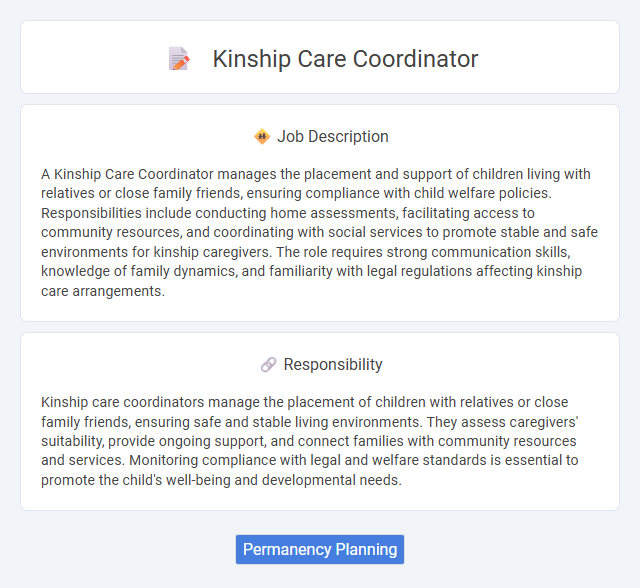
A Kinship Care Coordinator manages the placement and support of children living with relatives or close family friends, ensuring compliance with child welfare policies. Responsibilities include conducting home assessments, facilitating access to community resources, and coordinating with social services to promote stable and safe environments for kinship caregivers. The role requires strong communication skills, knowledge of family dynamics, and familiarity with legal regulations affecting kinship care arrangements.
Individuals with strong organizational skills, empathy, and experience in child welfare are likely to be well-suited for a kinship care coordinator role. Those who can navigate complex family dynamics and provide support to caregivers may find this position aligns with their strengths. Candidates lacking patience or difficulty managing sensitive situations may face challenges in fulfilling the responsibilities effectively.
Qualification
A Kinship Care Coordinator typically requires a bachelor's degree in social work, psychology, or a related human services field, with many positions favoring candidates holding a master's degree. Relevant certifications such as Licensed Social Worker (LSW) or Certified Family Life Educator (CFLE) enhance professional credibility and demonstrate specialized expertise. Experience in child welfare, family services, or case management is crucial, along with strong knowledge of kinship care policies and community resources.
Responsibility
Kinship care coordinators manage the placement of children with relatives or close family friends, ensuring safe and stable living environments. They assess caregivers' suitability, provide ongoing support, and connect families with community resources and services. Monitoring compliance with legal and welfare standards is essential to promote the child's well-being and developmental needs.
Benefit
Kinship care coordinators likely enhance family stability by connecting relatives with essential resources and support networks, which may improve child well-being and placement success. Their role probably reduces foster care system strain by encouraging placements within familiar family environments, potentially leading to better long-term outcomes. Families involved in kinship care might experience increased access to educational, financial, and emotional assistance through the coordinator's guidance.
Challenge
Kinship care coordinators likely face challenges balancing the complex emotional needs of children with the administrative responsibilities of case management. There is a high probability that they must navigate limited resources while ensuring relatives provide safe and stable environments. Managing communication between families, social services, and legal entities often requires strong problem-solving skills under pressure.
Career Advancement
Kinship care coordinators manage and support relatives providing care to children, ensuring compliance with relevant child welfare regulations and facilitating access to resources. Career advancement opportunities include roles such as program manager, child welfare supervisor, or social services director, often requiring specialized certifications and advanced degrees in social work or human services. Developing expertise in family dynamics, case management software, and community resources enhances prospects for leadership positions within child welfare organizations.
Key Terms
Permanency Planning
A Kinship Care Coordinator specializes in permanency planning by facilitating safe, stable placements for children with relatives or close family friends, ensuring continuity and emotional security. They assess kinship caregivers' suitability, provide necessary resources and support, and collaborate with legal and social services to finalize guardianship or adoption arrangements. The coordinator's role is critical in reducing foster care disruption and promoting long-term family stability.
 kuljobs.com
kuljobs.com